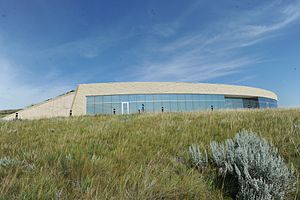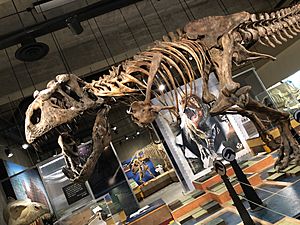T.rex Discovery Centre facts for kids
The T.rex Discovery Centre is a cool natural history museum in Eastend, Saskatchewan, Canada. It opened in 2001. This museum was built to show off many amazing fossils. One of the most famous fossils here is a Tyrannosaurus dinosaur. Its nickname is "Scotty". Scotty's bones were found nearby in 1991. The Royal Saskatchewan Museum started managing the T.rex Discovery Centre in 2013.
Contents
Discovering the Past: The T.rex Discovery Centre
The idea for a special place to keep fossils from southwest Saskatchewan started in 1988. People in the town of Eastend, Saskatchewan wanted a centre. They hoped it would show off the many fossils found in the Frenchman River Valley and the Cypress Hills. The T.rex Discovery Centre opened its doors in 2001. It is located in the Frenchman River Valley, about 25 kilometers southeast of Eastend. On February 14, 2013, the Royal Saskatchewan Museum took over running the centre.
Exploring Ancient Worlds: Museum Galleries
The T.rex Discovery Centre has different areas to explore. Each area, called a gallery, shows off different parts of Earth's history. You can see fossils from millions of years ago.
Cretaceous Period: Dinosaurs and More
This gallery takes you back to the Cretaceous Period. It shows the layers of rock called the Bearpaw Formation and the Frenchman Formation. These rocks hold many fossils. You can see ancient sea creatures like ammonites and baculites. There are also fossils of fish, sharks, turtles, and marine reptiles. From the Frenchman Formation, you'll find famous dinosaurs. These include Tyrannosaurus rex, Triceratops, and Hadrosaurus.
Cenozoic Era: Life After Dinosaurs
After the dinosaurs disappeared, new life forms appeared. This gallery explores the Cenozoic Era. Some animals like mammals, birds, and fish survived the big extinction event. The Ravenscrag Formation is where fossils from this time were found. This gallery shows creatures that lived in Saskatchewan's prehistoric landscape. You can see ancient reptiles like Borealosuchus and Champsosaurus. There is also a life-size model of a huge mammal called a Brontothere.
Fossil Research: What Scientists Do
The museum has a special area called the Fossil Research Station. Here, museum scientists called palaeontologists work all year. They study the fossils that were found during the summer. This research helps us learn more about ancient life.
Scotty the T. rex: A Giant Discovery
Scotty is a very famous T. rex fossil. It was found by a team from the Royal Saskatchewan Museum. The discovery happened in Saskatchewan's Frenchman River Valley on August 16, 1991. The fossilized bones, known as [RSM P2523.8], were carefully removed. This took over two decades, mostly by hand! By 2011, the preparation was finished. Scientists found that about 65% of Scotty's skeleton was complete.
Robert Gebhardt, a local high school principal, found Scotty on August 16, 1991. He was with palaeontologists Tim Tokaryk and John Storer from the Royal Saskatchewan Museum. They were looking for fossils near the Frenchman River Valley. Gebhardt found a tail bone of the T. rex on a cattle path. Later, they found a piece of its jaw with teeth still attached sticking out of a hill. Today, about 65% of Scotty's bones have been recovered.
A copy, or cast, of Scotty was first shown at the T.rex Discovery Centre on March 15, 2013. Another cast was displayed in an exhibit by the Australian Museum in November 2013.
On March 21, 2019, scientists announced something amazing about Scotty. They said it was the largest and oldest T. rex ever found! They estimated Scotty weighed about 8,870 kilograms (almost 19,500 pounds). It was about 13.2 meters (43 feet) long. Scientists also believed Scotty lived for over 30 years. Before Scotty, the T. rex named Sue held the record for being the longest-lived, at 28 years.
On May 17, 2019, a cast of Scotty was also shown at the Royal Saskatchewan Museum.




